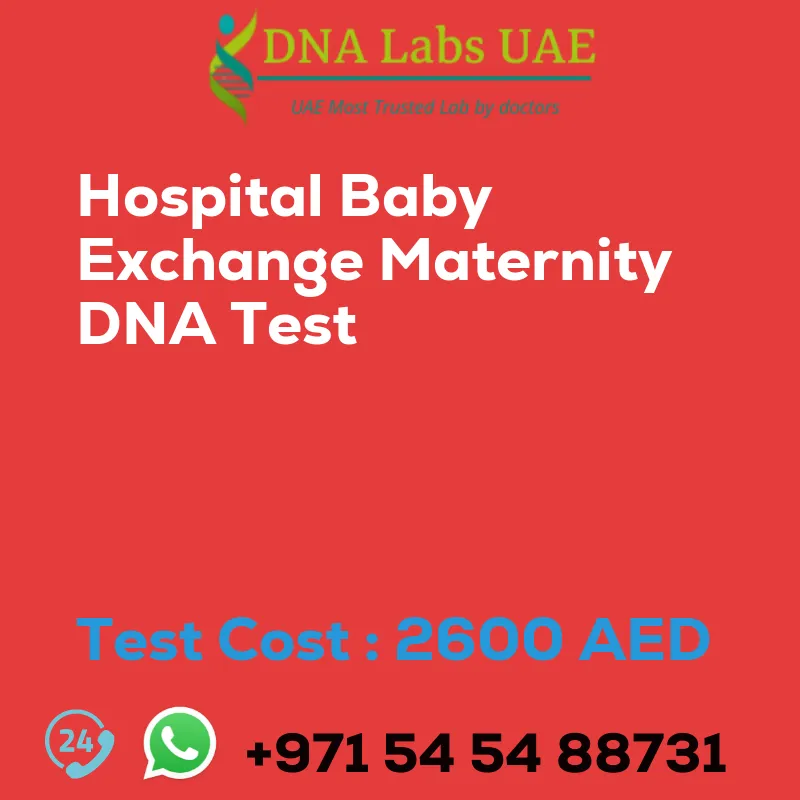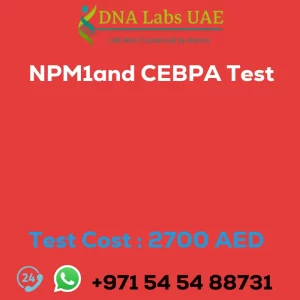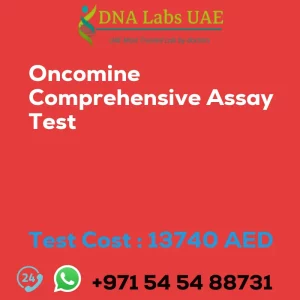Hospital Baby Exchange Maternity DNA Test
Are you concerned about the identity of your newborn baby? Do you suspect a baby exchange or mix-up at the hospital? DNA Labs UAE offers a Hospital Baby Exchange Maternity DNA Test to help establish the biological relationship between a mother and her newborn baby.
Test Details
A hospital baby exchange maternity DNA test is a test conducted to determine the biological relationship between a mother and her newborn baby in cases where there is a suspicion of a baby exchange or mix-up at the hospital. This test is typically requested by parents who have doubts or concerns about the identity of their child.
The test involves collecting DNA samples from the mother, the baby, and the alleged biological father (if available) through a simple cheek swab or blood sample. The samples are then sent to our laboratory for analysis.
Our laboratory analyzes the DNA samples to compare specific genetic markers between the mother and the baby. The results of the test will determine whether the tested mother is biologically related to the tested baby or not.
If the test results confirm a biological relationship between the mother and the baby, it indicates that there was no baby exchange or mix-up at the hospital. However, if the test results show no biological relationship between the mother and the baby, it suggests the possibility of a baby exchange or mix-up.
It is important to note that hospital baby exchanges or mix-ups are extremely rare, and such tests are usually conducted to provide peace of mind to concerned parents. The accuracy of these tests is generally very high, providing reliable results to resolve any doubts or concerns.
Test Name
Hospital Baby Exchange Maternity DNA Test
Components
For Establishing Maternity / Kinship / Lineage studies
Price
2600.0 AED
Sample Condition
Report Delivery: 10 Days
Method
Relationship DNA Test
Test Type
Psychology
Doctor
Physician
Test Department
Forensics
Pre Test Information
In a maternity test, the child alleged mother and biological father are tested. The father’s participation in the maternity test helps to exclude half of the child’s DNA, leaving the rest for comparison with the alleged mother. If the father is not available, we can perform a fatherless test which involves additional analysis without additional charge.
| Test Name | Hospital Baby Exchange Maternity DNA Test |
|---|---|
| Components | For Establishing Maternity / Kinship / Lineage studies |
| Price | 2600.0 AED |
| Sample Condition | |
| Report Delivery | 10 Days |
| Method | Relationship DNA Test |
| Test type | Psychology |
| Doctor | Physician |
| Test Department: | Forensics |
| Pre Test Information | In a maternity test, the child alleged mother and biological father are tested. The father participation in the maternity test helps to exclude half of the childs DNA leaving the rest for comparison with the alleged mother. If the father is not available we can perform a fatherless test which involves additional analysis without additional charge. |
| Test Details |
A hospital baby exchange maternity DNA test is a test conducted to determine the biological relationship between a mother and her newborn baby in cases where there is a suspicion of a baby exchange or mix-up at the hospital. This test is typically requested by parents who have doubts or concerns about the identity of their child. The test involves collecting DNA samples from the mother, the baby, and the alleged biological father (if available) through a simple cheek swab or blood sample. The samples are then sent to a laboratory for analysis. The laboratory analyzes the DNA samples to compare specific genetic markers between the mother and the baby. The results of the test will determine whether the tested mother is biologically related to the tested baby or not. If the test results confirm a biological relationship between the mother and the baby, it indicates that there was no baby exchange or mix-up at the hospital. However, if the test results show no biological relationship between the mother and the baby, it suggests the possibility of a baby exchange or mix-up. It is important to note that hospital baby exchanges or mix-ups are extremely rare, and such tests are usually conducted to provide peace of mind to concerned parents. The accuracy of these tests is generally very high, providing reliable results to resolve any doubts or concerns. |








